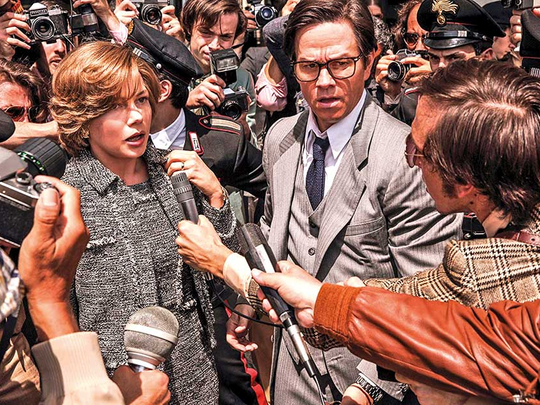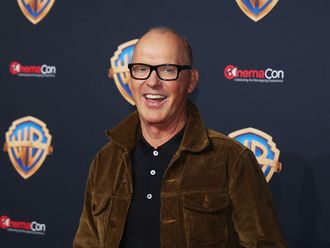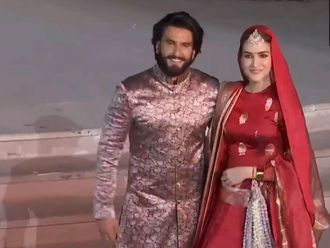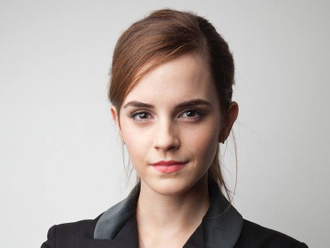
Stars are sharing their shock at reports of a significant pay disparity between Mark Wahlberg and Michelle Williams for reshoots on the Ridley Scott film All the Money in the World.
Two reports say Wahlberg was paid far more than Williams for the reshoots in which Kevin Spacey replaced Christopher Plummer after accusations of sexual misconduct surfaced against Spacey. USA Today reported this week that Wahlberg was paid $1.5 million (Dh5.5 million) for the 10 days of reshoots, while Williams got less than $1,000 (Dh3,673) for the same work.
Representatives for Wahlberg and Williams did not respond to requests for comment on Friday. Imperative Entertainment, which produced the film, declined to comment.
But actor Liam Neeson said it’s a healthy and necessary discussion to have, because “the disparity, sometimes, is [expletive] disgraceful.”
“We as men have got to be part of it,” he told The Associated Press earlier this week. “We started it, so we have to be part of the solution.”
He said he wouldn’t take a pay cut to make things equal, “but there has to be parity. There just has to be”.
Actress Diane Kruger said she was surprised by the size of the wage gap between Wahlberg and Williams, but that she also isn’t paid the same as the men she works with.
“I have never been paid the same as my male co-star, ever,” Kruger said. “But often it’s not them. It’s the studios or whoever makes the deal, and it’s terrible because it makes you feel undervalued or easily exchangeable. And it’s just not OK, in any field, not just as an actor ...
“I think we need to be more conscious when we make deals, to be strong and stay united ... where we have a coherent plan of us women, what we need to do to make this happen.”
Veteran actress Rita Moreno also said she was shocked by the news, but she doesn’t blame Wahlberg.
“That’s his business. That’s what actors do — they get paid very handsomely, especially if they’re big stars,” she said. “She’s a big star too though. I don’t get that.”
Guillermo del Toro, who shouted about women’s equality as credits rolled on the Critics’ Choice Awards Thursday night, said he makes sure actresses on his productions are treated fairly.
“I think it’s incredibly important, because the work and the profession are exactly the same,” he said, adding that Hollywood used to recognise that. “If you go back to the golden era of Hollywood, this is not something that was happening then. You had great actresses — Joan Crawford, Bette Davis — that were fuel for the movies, that were engines for the movies, and were treated and paid and considered in the same realm. Whenever it changed, it should change back.”
The Handmaid’s Tale actor Joseph Fiennes said women should take action if things don’t change.
“I’m reminded of Iceland, 1979, when all the women went on strike,” he said. “They went on strike; they gave the babies to the men; they disappeared. The country fell down and now it’s the only country in Europe that has practically parity of pay and has since had two female leaders. So, you have to go on strike. You can’t give up, and you get results that way.”
But before Hollywood grappled so publicly with sexual harassment and assault, the gender pay gap was one of the industry’s dominant issues. Here are the other recent controversies:
Jennifer Lawrence
The Sony hack brought out a lot of dirty laundry in the industry, including pay discrepancies for the 2013 movie American Hustle. Lawrence was an international star at the time, thanks to her Hunger Games franchise, and an Oscar winner. But through the hack, she discovered in 2014 that she got paid less than her male co-stars (Bradley Cooper, Christian Bale and Jeremy Renner).
A year later, Lawrence wrote an essay for Lenny Letter directly addressing the pay gap and, in particular, drawing attention to the double-standards women encounter when negotiating. After the hack:
“I didn’t get mad at Sony. I got mad at myself. I failed as a negotiator because I gave up early. I didn’t want to keep fighting over millions of dollars that, frankly, due to two franchises, I don’t need ... But if I’m honest with myself, I would be lying if I didn’t say there was an element of wanting to be liked that influenced my decision to close the deal without a real fight. I didn’t want to seem ‘difficult’ or ‘spoiled’. At the time, that seemed like a fine idea, until I saw the payroll on the internet and realised every man I was working with definitely didn’t worry about being ‘difficult’ or ‘spoiled’.”
Amy Adams
Adams was also paid less than her male co-stars in American Hustle.
“She worked everyday on that movie and got paid nothing. It’s really horrible actually, it’s almost embarrassing,” her co-star Cooper later said. “[She] should have been paid more than everybody” for her work on the film.
Adams later said that she knew she was getting paid less than her male co-stars.
“I didn’t speak about it before and I’m probably not going to speak about it forever, because I disagreed with ... not Jennifer per se, but people who had opinions on how women should go about negotiating,” the actress told GQ in 2016. “The truth is we hire people to negotiate on our behalf, men and women ... I knew I was being paid less and I still agreed to do it because the option comes down to do it or don’t do it. So you just have to decide if it’s worth it for you. It doesn’t mean I liked it.”
Natalie Portman
The actress revealed last year that Ashton Kutcher got paid three times more than her for the 2011 romcom No Strings Attached.
“I knew and I went along with it because there’s this thing with ‘quotes’ in Hollywood,” she said in a Maire Claire interview. “His [quote] was three times higher than mine so they said he should get three times more. I wasn’t as [angry] as I should have been. I mean, we get paid a lot, so it’s hard to complain, but the disparity is crazy.”
She continued: “Compared to men, in most professions, women make 80 cents to the dollar. In Hollywood, we are making 30 cents to the dollar.”
Emma Stone
When discussing her role in Battle of the Sexes, Stone revealed that in her career, male co-stars have taken a pay cut so that she can have parity with them. “That’s something they do for me because they feel it’s what’s right and fair. That’s something that’s also not discussed, necessarily — that our getting equal pay is going to require people to selflessly say, ‘That’s what’s fair’. If my male co-star, who has a higher quote than me but believes we are equal, takes a pay cut so that I can match him, that changes my quote in the future and changes my life.”
Taraji P. Henson
Although she would go on to be nominated for a supporting actress Oscar for her role in The Curious Case of Benjamin Button, Henson would later write that she ended up getting paid “the equivalent of sofa change” compared to what co-stars Brad Pitt and Cate Blanchett received. As she wrote in her memoir, Henson’s manager at one point asked for “somewhere in the mid six figures — no doubt a mere percentage” of the millions Pitt got, but was denied. She also had to pay her own location fees while filming in New Orleans. As she wrote: “The math really is pretty simple: There are way more talented black actresses than there are intelligent, meaningful roles for them, and we’re consistently charged with diving for the crumbs of the scraps, lest we starve. This is exactly how a studio can get away with paying the person who’s name is third on the call sheet of a big-budget film less than 2 per cent what it’s paying the person whose name is listed first. I knew the stakes: No matter how talented, no matter how many accolades my prior work had received, if I pushed for more money, I’d be replaced and no one would so much as a blink.”
Patricia Arquette
Her rousing 2015 Oscars acceptance speech ended with a call-to-action that cast a light on the gender pay gap.
“To every woman who gave birth, to every taxpayer and citizen of this nation, we have fought for everybody else’s equal rights,” she said after winning for best supporting actress for Boyhood. “It’s our time to have wage equality once and for all and equal rights for women in the United States of America.”
The next year, Arquette said on the red carpet that since her speech, she had lost or had to walk away from roles. “I know that there was an issue with a couple of things, for sure, because I said something that made it very obvious. But it’s OK because I do believe in karma,” she told Entertainment Tonight. “And before I said it, I knew there was going to be some drama, because it would cost people money.”
She added: “But there are 33 million women and kids that are living in poverty in America, with a full-time working mom. So, we need to address this and we need to address this right away.”
Catt Sadler
The E! anchor left the network last month because, she said, she was getting paid half of what her male co-star made. Sadler said that her team “asked for what I know I deserve and were denied repeatedly” during negotiations.
Celebrities such as Debra Messing and Eva Longoria called out Sadler’s departure on E! itself during the network’s Sunday’s Golden Globes red-carpet coverage.
By Tuesday, Frances Berwick, who heads up E! and other NBC entertainment networks, said publicly that Sadler and her co-host Jason Kennedy had different roles “and therefore different salaries”, Variety reported. “Our employees’ salaries are based on their roles and their expertise, regardless of gender. So we wish Catt well, but I hope that sets the record straight on that.”













